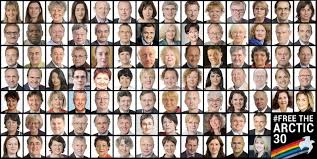 Amsterdam, 18 December 2013 – The Greenpeace activists who spent two months in jail after a peaceful protest in the Arctic have expressed relief after the Russian parliament voted to grant them amnesty. But they also declared: “There is no amnesty for the Arctic.”
Amsterdam, 18 December 2013 – The Greenpeace activists who spent two months in jail after a peaceful protest in the Arctic have expressed relief after the Russian parliament voted to grant them amnesty. But they also declared: “There is no amnesty for the Arctic.”
The Duma today voted for an amendment that extends an amnesty decree to defendants who have been charged with hooliganism. It therefore includes the Arctic 30 – the 28 activists and two freelance journalists who were arrested following a peaceful protest at a Gazprom-operated Arctic oil platform three months ago today. There will be a final vote at 4pm Moscow time, but the only way the Arctic 30 would be removed from the amnesty is if the entire bill is rejected – an outcome regarded as extremely unlikely.
The legal proceedings against the Arctic 30 are now almost certain to come to an end and the 26 non-Russians will be free to return home to their families as soon as they are given exit visas by the Russian authorities.
Ana Paula Maciel from Brazil is one of the people who was seized in international waters when the Greenpeace ship Arctic Sunrise was boarded by armed Russian commandos before being towed to Murmansk. Reacting to today’s developments, she said:
“I’m relieved, but I’m not celebrating. I spent two months in jail for a crime I didn’t commit and faced criminal charges that were nothing less than absurd. But now at last it seems like this saga could soon be over and it may not be long before we’re back with our families. Right now my thoughts are with our Russian colleagues. If they accept this amnesty they will have criminal records in the country where they live, and all for something they didn’t do. All because we stood up for Arctic protection.”
Peter Willcox is the Captain of the Arctic Sunrise. He said:
“I might soon be going home to my family, but I should never have been charged and jailed in the first place. We sailed north to bear witness to a profound environmental threat but our ship was stormed by masked men wielding knives and guns. Now it’s nearly over and we may soon be truly free, but there’s no amnesty for the Arctic. We may soon be home, but the Arctic remains a fragile global treasure under assault by oil companies and the rising temperatures they’re driving. We went there to protest against this madness. We were never the criminals here.”
Assuming the decree is passed at third reading later today, it is unclear when the non-Russians amongst the Arctic 30 will be able to leave the country. At present they do not have the correct stamps in their passports, having been brought to Russia by commandos after being illegally seized in international waters. By accepting the amnesty they will not be admitting guilt, but the legal proceedings against them will come to an end. The fate of the Arctic Sunrise, currently impounded in Murmansk, remains uncertain, despite the order of an international court that it be released following a case brought by the Dutch government.
The campaign to free the Arctic 30 has seen 860 protests in 46 countries and in more than 150 cities worldwide, while more than 2.6 million people wrote to Russian embassies. Supporters included Sir Paul McCartney, Madonna, Jude Law, Oscar-winning actress Marion Cotillard, Ewan McGregor, Juliette Lewis, Ricky Martin, Edward Norton, Gael García Bernal, Ricardo Darín, Alejandro Sanz, Pedro Almodóvar and scores more famous names.
Political support was offered by Brazilian President Dilma Rousseff, Angela Merkel, David Cameron, François Hollande, Ban Ki-moon and Hillary Clinton. Twelve Nobel Peace Prize winners called for their release, including Desmond Tutu, Aung San Suu Kyi and Lech Walesa.
